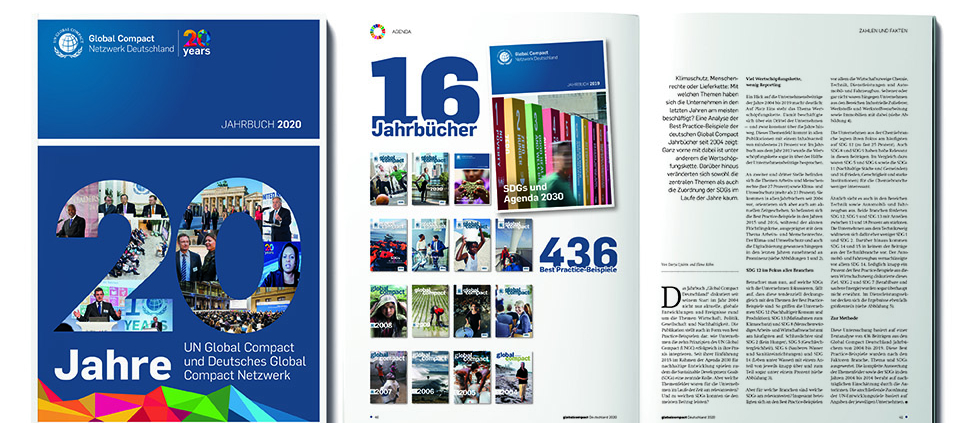20 Jahre UN Global Compact – Jahrbuch erschienen
Vor zwanzig Jahren wurde der Global Compact ins Leben gerufen. Der damalige UN-Generalsekretär Kofi Annan forderte, dass Globalisierung für alle gelingen müsse. Mit Hilfe von zehn Prinzipien drängte der Compact auf weltweit gleiche Regeln. Die aktuelle Ausgabe des deutschen Global Compact Jahrbuchs zieht Bilanz, lässt wichtige Protagonisten zu Wort kommen und beleuchtet mit vielen Praxisbeispielen die ungebrochene Aktualität der UN-Initiative. Das Jahrbuch umfasst 120 Seiten und ist im Fachhandel und online erhältlich.
Als eines der ersten von rund 70 lokalen Netzwerken des UN Global Compact beging das Deutsche Global Compact Netzwerk (DGCN) in diesem Jahr ebenfalls sein 20-jähriges Jubiläum. Marcel Engel, Leiter der Geschäftsstelle des DGCN, gibt sich optimistisch: „Bemerkenswert ist, dass die Teilnahme im deutschen Netzwerk seit Ausbruch der Coronavirus-Pandemie um über 20 Prozent gestiegen ist. Wir hoffen, dies als Zeichen deuten zu können, dass das Engagement der Wirtschaft für eine nachhaltige Zukunft auch – oder gerade – in diesen herausfordernden Zeiten nicht nachlassen wird. Und dieses Engagement ist dringender denn je.“
In Anbetracht des langsamen Fortschritts bei der Umsetzung der in der Agenda 2030 enthaltenen Globalen Nachhaltigkeitsziele (SDGs) hatte der UN-Generalsekretär António Guterres bereits Ende 2019 die Weltgemeinschaft zu einer „Dekade des Handelns“ aufgerufen. Dabei richtete er seinen Appell explizit auch an die Wirtschaft, deren Investitions- und Innovationskraft unabdingbar für die Erreichung der 17 SDGs ist. Dies gilt umso mehr in Hinblick auf die gravierenden Auswirkungen der COVID-19-Pandemie, die viele Fortschritte der letzten Jahre, insbesondere in Bezug auf die Verbesserung der Lebensbedingungen benachteiligter Teile der Weltbevölkerung, auf einen Schlag zu vernichten droht.
Dabei ist zu betonen, dass der Fokus auf Nachhaltigkeitsthemen in der Wirtschaft keineswegs uneigennützig ist. Das Wirtschaftsumfeld hat sich radikal geändert. Ob Klimawandel, Menschenrechtsverstöße, planetarische Übernutzung oder mangelnde Verteilungsgerechtigkeit – sie alle haben unmittelbare Auswirkungen auf die Wettbewerbsfähigkeit oder gar Existenz von Unternehmen. Nachhaltigkeit ist schon lange nicht mehr optional, sondern zunehmend Kernbestandteil unternehmerischen Handelns. Sie wird immer mehr zum zentralen Treiber für Effizienz, Resilienz und Innovation und verhilft somit Unternehmen, Risiken zu minimieren, ihre Akzeptanz zu steigern, innovative Produkte zu entwickeln, neue Märkte zu erschließen, den Zugang zu Kapital zu sichern sowie talentierte Arbeitskräfte zu rekrutieren.
Global Compact Deutschland 2020
Münster 2021: macondo publishing Verlag
120 Seiten, Paperback
ISBN-13: 978-3-946284-10-9
EUR 15,00
Printausgabe bestellen
Kostenfreies E-Book lesen
Stimmen
„Die Antwort auf die Globalisierung lautet also globale Verantwortung. Zusammenarbeit auf der Grundlage der globalen Nachhaltigkeitsziele entscheidet über unser aller Zukunft: Entsprechend zukunftsweisend erweist sich verantwortungsvolle Unternehmensführung im Sinne des Global Compact. Herzlichen Dank Ihnen allen, die sich dafür stark machen.“
Dr. Angela Merkel, Bundeskanzlerin
„Kofi Annan war 1998 Gastredner auf dem World Economic Forum, und er war nicht sehr angetan. Er hat dann ganz klar gesagt, ich gehe da nur noch hin, wenn ich etwas Wichtiges zu sagen haben. Der Job ist auf mich gefallen, etwas Entsprechendes für ihn vorzubereiten.“
Georg Kell, erster Exekutivdirektor des UN Global Compact (2000-2015)
„In den letzten fünf Jahren seit der Einführung der Global Goals hat sich die Agenda für nachhaltiges Wirtschaften von einer sehr spezialisierten Agenda hin zu einem Top-Thema des Managements entwickelt.“
Lise Kingo, Exekutivdirektorin des UN Global Compact (2015-2020)
„Wir müssen bei Nachhaltigkeitsthemen vorwärts kommen, und das sehen alle Seiten ein. Unsere Dialog-Formate können hier Brücken bauen, und das ist eigentlich das, was ich schon immer am DGCN gut finde.“
Angelika Pohlenz, Beiratsvorsitzende der Stiftung DGCN


